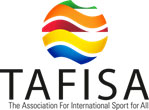

SPORT FOR ALL & SUSTAINABLE HEALTH PROJECT A FRAMEWORK FOR ACTIVE CITIES
1. Context
Rapid urban growth, in conjunction with an increase of sedentary lifestyles in all parts of the world, characterised by a fragmentation of community life and the development of non-communicable diseases (NCDs), sets a challenge for the generations to come. Nowadays, 130 cities have a population over three million people, and 19 mega cities are populated with more than ten million citizens. By 2050, there will be 27 of these mega cities; 70% of the world's population will live in urban areas. In short, the city setting will be the number one venue for sports participation.
Through their established infrastructure, public spaces, administration, communication systems, programmes, events and budget dedicated to sport, cities are the major providers and sponsors of Sport for All and physical activity throughout the world. They are the closest public body to their citizens and therefore can make a difference in promoting active lifestyles. However, there is a general lack of:
- Acknowledgement of the unique positioning of city authorities as agents of change
- Recognition of the positive and constructive impact on citizens of sport and physical activity combined with health and prevention measures
- Action on the part of communities (incl. organisations) in the fight against NCDs
- Support and resources for cities to improve available services for citizens in a structured and effective manner.
2. Purpose of this Project
The purpose of this project is the establishment of a Framework for Active Cities, targeting all interested cities around the world, amongst which Olympic cities will have a leading role to play.
This project is conducted by TAFISA and its partner Evaleo with the support and expert contribution of the International Olympic Committee (IOC) and a number of pilot Olympic cities.
- Tools that ensure simple, practical, field-tested and easy to implement solutions;
- Tools to assess their level of activeness and improve it, in a structured and effective way.
3. TAFISA & EVALEO
TAFISA, The Association For International Sport for All
TAFISA is an international, non-governmental, non-profit organisation, however TAFISA's main aim is to attract more people, from any and every location and demographic, to participate in Sport for All and physical activity worldwide.
EVALEO
EVALEO is a non-governmental organisation based in Lausanne, Switzerland, specialised in sustainable health. It links various techniques and professionals from the fields of sport, health, well-being, culture, the environment and management within an ISO-compatible sustainable health management system.
The TAFISA Triple AC (Active Cities, Active Communities, Active Citizens) programme, developed in cooperation with and supported by the IOC, constitutes a first answer to the existing problem and demand, by collecting communities' best practices, creating a database and a global network of active cities. EVALEO provides, through its sustainable health standard, the know-how for the integration of an ISO-compatible management system, an ongoing collection of best practices in the various domains of sustainable health, additional specialist solutions as well as a network of field and academic specialists.
4. Concept
This project is a natural progression of TAFISA's 3AC program (Active Cities, Active Communities, Active Citizens). The concept presented is the result of a long reflection and synchronisation (integration) of TAFISA, EVALEO's complementary standards & expertise and partner Cities in the fields of active cities and sustainable health.
It aims to provide cities (incl. Olympic Cities) and communities (incl. organisations) with a set of good practices, a management system including how to create cross sector Sport and Physical Activity alliances, guidelines, solutions, labels and certifications, networks to develop active city strategies and event legacy programmes. For cities, three successive and incremental levels of implementation have been conceptualised in order to take into account the diverse needs and realities cities and communities are facing, depending on their size, budget, obligations and aims. This project is a work in progress. Each level will be defined and structured in an ISO-compatible standard. These three levels of standards will lead to labelling. Requirements increase with each level of labelling. This phase of the project will take two years to complete.
5. Participating group of pilot cities
During these two years a group of pilot cities will be established to support this work. The experiences, needs, challenges, priorities, comments, suggestions from these cities will be taken fully into account in order to clarify and finalize both operating and technical aspects of the project.
One of the pioneers of an Active City approach is the City of Liverpool in the UK. Throughout the duration of the pilot phase of the project this city will share its experiences of creating:
- An Active City strategy
- A cross sector Sport and Physical Activity Alliance to lead on the delivery of the strategies priorities
- The establishment of an infrastructure which has led to participation in sport and physical activity being seen as a top priority within the city
- Stakeholder engagement with the public, politicians and partner organisations leading to shared priorities
- Significant reduction in duplication of effort
- Pooled resources (financial and staffing) resulting in actual savings
- How initiatives relating to sport, physical activity and sustainable health are now closely aligned
- How local, regional, national and international sporting events in the city benefit from the Alliance approach in terms of sustainability and legacy
A representative of the city together with other experts will also liaise with counterparts from the other pilot cities to share best practice and to create a systematic, fully tested approach which can provide solutions to cities around the world who want to become an accredited Active City.
6. Contact us
If you would like to express an interest on behalf of your city in being part of this exciting new global initiative then simply e-mail info@active-cities.org.
After this you will be kept fully informed of developments with the project and a limited number of cities will also be invited to be part of the pilot phase.